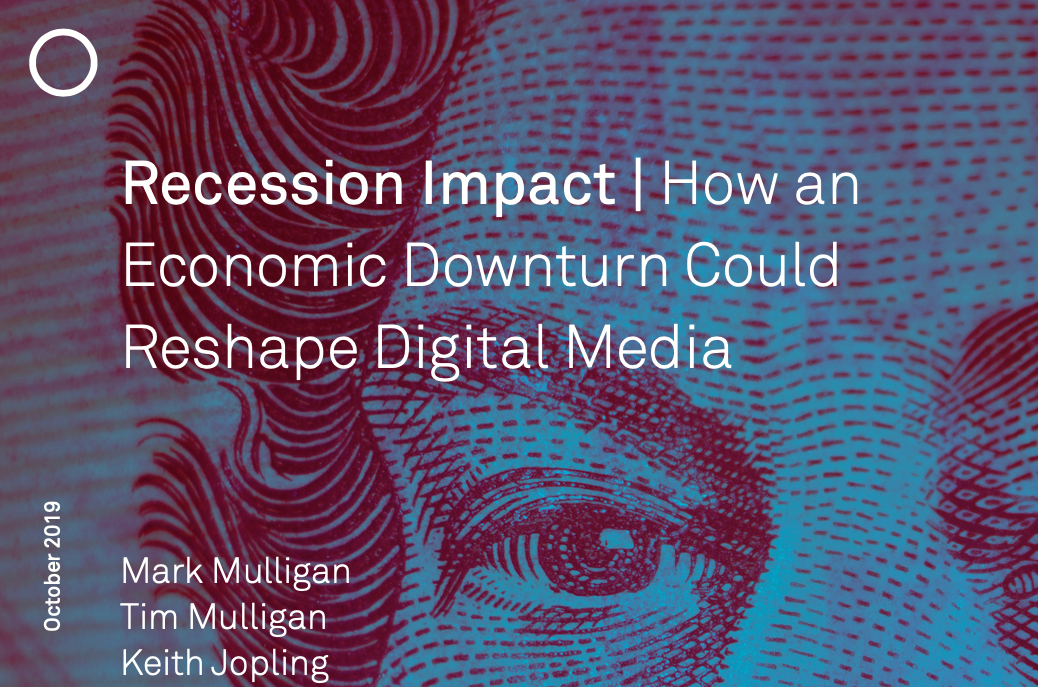How an economic downturn could reshape digital media


Ten years on from the credit crunch, the global economy could be poised to enter another recession. Many of the underlying causes of the credit crunch remain in place, due to governments lacking appetite for structural reform of the faults in the global financial system that catalysed the slowdown. Many of those unchecked factors remain, and with growing volatility in geopolitics a perfect storm could be brewing. A succession of potential unintended consequences could reshape a digital economy that has grown rapidly in an era of abundance and easy access to capital.
During a recession, consumers reduce their spending on non-essentials. Media falls squarely into that category, but digital media is particularly vulnerable for three key reasons:
- Streaming, easy to leave: The great promise of streaming subscriptions was built on convenience and value for money. These are the subscriptions that digital consumers are most likely to want to retain in a recession. However, they are also vulnerable to cancelling because a) they are contract-free and b) free alternatives are so good. Cost-conscious music fans would find the various inconveniences of downgrading to free (YouTube especially) as a dull pain compared to the cost savings – especially if they use the readily-available stream rippers and ad blockers. Similarly, video subscribers with pay-TV may want to finally cut the cord, only to find that there are early cancellation fees so end up having to cut Netflix instead. This is compounded by the fact that they can simply pop back in for the odd month to binge watch the latest series of their favourite Netflix Originals – but will never have an impetus to stay.
- Millennials hit hard: Recessions typically hit the lower echelons of workforces hardest and earliest. Millennials have been the fuel in the digital media engine, but these young professionals could be the ones who have greatest job insecurity, especially those in the (tech-enabled) gig economy. Conversely, older consumers still in the workforce will inherently increase in value, while those retired will experience little direct impact on their spending power. So, in relative terms, older consumers will become more valuable in a recession.
- Innovation slowdown: Research and development budgets will be the early victims of belt tightening at many digital media companies, but there will be another factor slowing innovation: ownership shifts. Struggling digital media companies may see investors taking full or partial ownership of the companies in order to protect their investments. This will particularly apply to companies that have used debt financing tools like convertible notes, which can result in investors converting debt into equity if targets are not met. Investors looking to protect their investments will be inherently more conservative in their strategic outlook, resulting in a slowing of costly innovation and product development.
Market outlook: fortune favours the brave
Previous economic downturns and market adjustments have seen winners and losers. Often this has as much to do with financial backing and strategic nous as with the quality of the product sets of the companies. Content budgets will likely contract to match the realities of the market, but those companies brave enough to make long-term bets could be the long-term winners. The labels still willing to invest strongly in new artists and artist marketing campaigns will likely have more impact in a less cluttered market suffering from under-investment. Similarly, TV, movie and games studios that are willing to continue to invest strongly in commissioning will see their content stand out from the rest. More than that, given the long production cycles of content, they will have the strongest rosters of content going into market when consumer spending power recovers. More conservative competitors will be playing catch up, waiting a year or more for their new investments to make it to market.
These findings are taken from the first report in MIDiA’s Recession Impact research series: 'Recession Impact: How an Economic Downturn Could Reshape Digital Media'.

The discussion around this post has not yet got started, be the first to add an opinion.